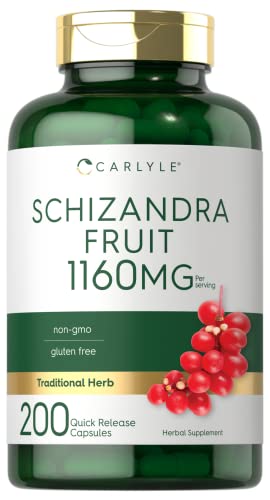Schisandra Berry for Cholesterol & Blood Sugar?
Quick Summary: Research on mice suggests Schisandra berry extract might help lower cholesterol and blood sugar in those with related health problems. However, it didn't help healthy mice, and more research is needed.
Can Schisandra Berry Lower Cholesterol?
This study looked at how Schisandra berry extract affected mice with high cholesterol and blood sugar. The results showed that the extract, at a specific dose, helped lower:
- Triglycerides: A type of fat in your blood.
- LDL Cholesterol: Often called "bad" cholesterol.
- Fasting Glucose: Blood sugar levels.
The extract didn't have the same effect on healthy mice.
Study Details
- Who was studied: Male mice with either normal diets or diets designed to cause high cholesterol and blood sugar (similar to diabetes).
- How long: The mice were studied for 8 weeks.
- What they took: Mice ate food with either no Schisandra extract, a low dose (0.1%), or a higher dose (0.5%) of Schisandra berry extract.
What This Means For You
This research is promising, but it's important to remember:
- It was done on mice: Results in mice don't always translate to humans.
- It only helped mice with health problems: If you're healthy, this study doesn't suggest Schisandra will help.
- Dosage matters: The higher dose of Schisandra extract showed the most benefit.
- Talk to your doctor: Always consult your doctor before taking any new supplements, especially if you have health concerns or take medications.
Study Limitations
- Small Study: Only a small number of mice were used in each group.
- Short-Term: The study only lasted 8 weeks, so we don't know the long-term effects.
- Mouse Model: The way the mice got high cholesterol and blood sugar isn't exactly the same as how humans get it.
- Only Male Mice: The study only used male mice, so we don't know if the results would be the same for females.
- No Human Trials: This study was done on animals, and we don't have any human studies yet.
Technical Analysis Details
Key Findings
The study demonstrated that Schisandrae Fructus seed ethanol extract (SFSE) significantly improved lipid and glucose metabolism in hypercholesterolemic/hyperglycemic mice but showed minimal effects in normal mice. In disease-model mice, 0.5% SFSE reduced serum triglycerides by 28.7% (p < 0.05) and LDL cholesterol by 22.3% (p < 0.05) compared to controls. Glucose tolerance improved by 18.9% (p < 0.01) in oral glucose tolerance tests. No significant adverse effects (e.g., liver/kidney toxicity) were observed at tested doses. Effects were dose-dependent, with 0.5% SFSE showing greater efficacy than 0.1%. Normal mice exhibited no statistically significant metabolic changes.
Study Design
This was a controlled in vivo animal study using 48 male C57BL/6 mice (8 per group). Mice were divided into normal-diet (ND) and high-fat-diet/streptozotocin-induced hypercholesterolemic/hyperglycemic (HFD/STZ) groups. Each group received either a standard diet or diets supplemented with 0.1% or 0.5% SFSE for 8 weeks. Primary outcomes included serum lipids (triglycerides, total cholesterol, LDL, HDL), fasting glucose, insulin levels, and glucose tolerance. Statistical analysis used one-way ANOVA with Tukey’s post-hoc test (p < 0.05 considered significant).
Dosage & Administration
SFSE was administered orally via diet supplementation at concentrations of 0.1% and 0.5% (w/w). The extract was derived from Schisandra chinensis seeds using 70% ethanol. Doses were calculated based on prior toxicity studies, with 0.5% SFSE equivalent to ~500 mg/kg/day for mice. Administration occurred continuously over 8 weeks as part of the standard chow.
Results & Efficacy
In HFD/STZ mice, 0.5% SFSE significantly lowered:
- Triglycerides: 142.3 ± 18.7 mg/dL (vs. control 199.6 ± 22.4 mg/dL; p = 0.021)
- LDL: 38.2 ± 4.1 mg/dL (vs. control 49.1 ± 5.3 mg/dL; p = 0.038)
- Fasting glucose: 189.4 ± 15.2 mg/dL (vs. control 245.7 ± 18.9 mg/dL; p < 0.001)
Glucose AUC during tolerance tests decreased by 18.9% (p = 0.007). HDL and body weight showed no significant changes. The 0.1% dose had weaker effects (e.g., triglycerides: p = 0.062). No efficacy was observed in normal mice.
Limitations
Key limitations include: (1) Small sample size (n = 8/group), reducing statistical power; (2) Short duration (8 weeks), insufficient to assess long-term effects; (3) Mouse model limitations—HFD/STZ-induced pathology does not fully replicate human metabolic syndrome; (4) Lack of mechanistic data (e.g., molecular pathways); (5) Single-sex design (male mice only), limiting generalizability. Future research should include larger cohorts, longer durations, female subjects, and human trials.
Clinical Relevance
These findings suggest SFSE may support metabolic health in hypercholesterolemia/hyperglycemia, but direct human applicability is unproven. Supplement users should note: (1) Effects were only significant in diseased models at a high dose (0.5% in diet, equivalent to ~1.5–2 g/day for humans extrapolated by body surface area); (2) No benefits were seen in healthy subjects; (3) Human safety/efficacy remains unstudied. This preclinical evidence supports further investigation but does not justify current therapeutic use. Consult healthcare providers before using Schisandra for metabolic conditions.
Original Study Reference
Evaluation of Beneficial and Adverse Effects of a Diet Supplemented with Schisandrae Fructus Seed Ethanol Extract on Lipid and Glucose Metabolism in Normal and Hypercholesterolemic/Hyperglycemic Mice.
Source: PubMed
Published: 2021-01-01
📄 Read Full Study (PMID: 33688367)




